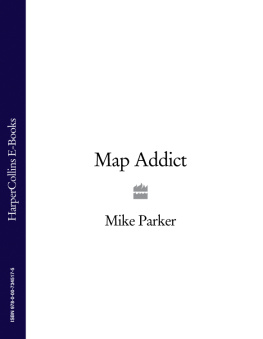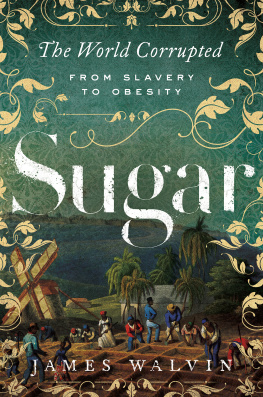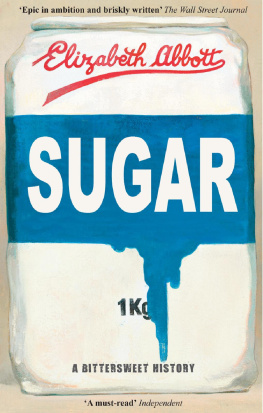THE SUGAR BARONS
Family, Corruption, Empire, and War
in the West Indies
MATTHEW PARKER

CONTENTS
For my brilliant sister Caroline, with whom I shared many
West Indian adventures
INTRODUCTION
Hot as Hell, and as Wicked as the Devil
On a voyage to Jamaica, but held at anchor for three freezing days off Deal because of unfavourable winds, Grub Street writer Ned Ward looked around him at his travelling companions. Seeking new opportunities in the West Indies was a decidedly mixed collection of his fellow British countrymen and women. It was January 1697, but it could have been any time between 1630 and 200 years later: the ships company was a timeless array of the hopeful, disappointed and desperate. There was a salesman, recently fired; three Broken Tradesmen, who had lost their Credit; two Parsons, who had lost their Livings; and several, like me, wrote Ward, who had lost their Wits. The three women on board consisted of a widow, another woman in pursuit of an errant husband and a maid who, I fear, had Lost her self. The small party of passengers also included a decrepit ships captain, an agricultural labourer deported for being caught up in a recent rebellion, and a young Irishman who had been got drunk and then been tricked into servitude on the plantations. All were going, wrote Ward, with one Design, to patch up their Decayd Fortune.
At last the vessel, the 400-ton Andalucia, weighed anchor and, enjoying a prosperous Gale, headed steadily westwards down the Channel. Past Lands End, she steered more southerly. After two weeks, the cold of January in England gave way to a pleasant warmth. The route to the West Indies followed that taken by Columbus 200 years earlier: south past Portugal and modern-day Morocco, then across the open ocean to Madeira and the Canary Islands, where the vessel could pick up the trade winds blowing towards the Caribbean.
Like the others on board, and the tens of thousands of people who had already travelled to the West Indies colonies before the end of the seventeenth century, Ward, too, wished to patch up his decayd Fortune; in short, to make money and to reinvent himself as a success, rather than a failure. He was 30, and as a writer, his chosen profession, had made little mark on the world. He was wildly in debt and drinking far too much. What little money he originally possessed had been frittered away in a Wilderness of Pleasure and Enjoyment, chatting up women, consuming oceans of wine and gambling with fellow Grub Street hacks. With his creditors closing in, he was now, he resolved, going to shun the Company of those who had nothing to do but Spend Money, for the Conversation of such whose practice was to Get it.
He was heading for the right place, to a society whose guiding principle, perhaps its only principle, was to make money. It was well known in London that Barbados was currently Englands richest colony, and Jamaica was on the way to taking over the title. Already, in a short space of time, families such as the Draxes, Codringtons and Beckfords had, from humble beginnings, become immensely, obscenely wealthy, selling the sugar from their plantations manned by enslaved Africans. In consequence, the West Indian islands had become for more than one state the foundation of their commercial and political greatness, and a test bed of national virility. The islands, in the most part minute specks in the sea, had therefore become bitterly contested between the rival great powers of the time, and were already dictating imperial policy.
Sugar itself would shortly become the most important commodity in the world enjoying a position in the eighteenth century akin to steel in the nineteenth and oil in the twentieth. As a result, the tiny tropical islands became the strategic centre of the Western world, the hinge on which global history turned. Less than a hundred years later, the importance of Jamaica, the size of Yorkshire and smaller than modern-day Connecticut, would contribute directly to the loss by Britain of the North American colonies.
In Wards time, emigrants from England to the Americas had a choice. But any with ambition for great wealth or indeed hopelessly in debt dreamed not of the prosaic settlements on the North American mainland, but of the West Indies. This was the place to get rich quick. As planters, eager for new recruits to the colonies, had been writing from the islands, even the most incorrigible jailbird from England could soon build up a great fortune.
Ned Ward, a professional cynic and wit, considered himself too savvy to believe all of this. He had heard, he wrote, extravagant Encomiums of that Blessed Paradise Jamaica, where Gold is more plentiful than Ice, Silver than Snow, Pearls than Hailstones.
His disbelieving tone indicates that current in London were other stories of the West Indies: the appalling attrition from a host of unfamiliar diseases; the barbarously sticky heat; the natural disasters; the frightening Carib natives and vengeful slaves; the incessant warfare; the privateers and pirates infesting the sea lanes. In all, the risk, the strangeness, the extreme insecurity.
Ward does not seem to have minded the claustrophobic conditions on board the sailing vessel, his tiny, cramped cabin and the boredom of long weeks at sea. He passed the time playing his flute on deck, to the consternation of the ships dog, and gambling at backgammon with one of the parsons. But before the coast of the Old World was out of sight, a fierce storm descended. It was late at night, and it struck a ships company that was already unsteady, having been well Moistend with an Exhilerating Dose of Right Honourable Punch. A ferocious wind made standing on deck impossibly perilous, and thunder and lightning was followed by such an excessive Rain, that as we had one Sea under us, we feard another had been tumbling upon our heads.
The storm raged almost all night, but the next day at first light an even greater danger presented itself. From high aloft, the lookout had spotted a sail bearing down on the Andalucia. They were off the coast of Morocco, near a port notorious for its Barbary pirates. The gravity of the situation was made clear to Ward by the speed with which the ships crew cleared the decks, readied the 28 guns, distributed firearms and prepared to repel boarders.
As the other vessel neared, they could see that it flew English colours, but this was not trusted, and the Andalucias captain, by raising and lowering sails, did all he could to give the impression that his ship was better manned than it actually was. Only when the other vessel came into hailing distance was there relief: it was indeed an English ship, on the way to Africa to collect slaves. Ward and his fellow passengers celebrated with more punch.
Soon afterwards, they picked up the trade winds and started across the Atlantic. Around them the sea was empty and the sky enormous, its changing occasional clouds often the only diversion. They were now in the tropics and it was hotter than anything Ward had ever known. Had modesty not forbidden it, he wrote, he would have gone naked on deck. New to him too, were the sharks, turtles, dolphins and flying fish that could be seen from the ship.
The greatest fear now was of being caught in a calm, a situation that had seen many ships crews starve to death. But luck was with the Andalucia, and after some six weeks at sea, they came in sight of the Leeward Islands gently curving in a chain to the north-west. Passing first Montserrat, then Antigua, Nevis and St Kitts, in a few days they reached Hispaniola. From there, with a fresh Gail, it took only 24 hours before they were in sight of Jamaica.














